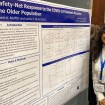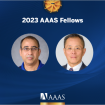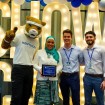Digital Humanities Projects by Medievalist Abigail Firey Reach Scholars Across the Globe
Abigail Firey didn’t set out to blaze trails in digital humanities. But that’s exactly what has happened in her quest to get a grasp on the enormous corpus of unpublished manuscripts that are part of her work in medieval canon law.
In this podcast Firey, the Theodore A. Hallam Professor (2017-2019) in the Department of History and a University Research Professor, recalls the chance encounter that changed her trajectory.
“In 2007 a researcher at UK in the Classics Department, Ross Scaife—deeply beloved—ran into me outside the library. And I was telling him about my work, and he said, ‘Have you considered a digital project?’ And I hadn't. And those few words really launched me into thinking about the ways that digital strategies and devices and tools might help us get at these thousands and thousands of manuscripts,” Firey said.
The first digital resource she began, the Carolingian Canon Law Project, gives scholars access to searchable texts of unpublished and unedited medieval manuscripts. Her second digital project, called Scriptorium, displays images of handwritten documents of any era in any language, so that scholars can study evidence scattered across libraries around the world.
“We built Scriptorium to support collaborative research practices. We also designed it to really facilitate rapid, good communication between scholars who may be working in different parts of the world. How do you share your work? How do you show each other the images and talk in real time about what it is you're seeing in them? How do you capture conversations and record ideas so that months, or even years, later, people can go back to them?”
Firey is quick to point out that none of this work would be possible without her collaborators, Noah Adler and Michael Paddock in the College of Arts and Sciences IT unit. She said, “I think of the coders as full collaborators and really value the generosity that they show in learning about something that they don't really need to know about—they’re very generous with their time and their talents. And I see that same generosity just running throughout the university.
“My research at UK has never been hindered or impeded. When I’ve talked to Chairs or Associate Deans of Research, the attitude they bring to those conversations is ‘how can we help you do this?’ And I think that that really shows how UK has not lost sight of the essential academic enterprise. This is a university, and we do what is done at a university, and that’s research and teaching.”
Digital Humanities Projects by Medievalist Abigail Firey Reach Scholars Across the Globe - Podcast Transcript
Have you ever wondered who was doing the research that will impact your future? The research podcast lets you met those people, and learn how the University of Kentucky is exploring and strengthening our understanding of the world through research and discovery.
Here's Alicia Gregory, director of Research Communications.
Alicia: Today we’ll meet Abigail Firey, the Theodore A. Hallam Professor in History at UK. She is creating digital resources for humanities scholars around the world.
Abigail Firey: I was and am still fascinated by law. Law as a form of expressing really important human ideas and ideals, ideologies. And, I'm also really fascinated by the impact of religion on society. So, when you put together law and religion, you end up thinking about Ecclesiastical Law, which is what Canon Law is.
I’m an Early Medievalist. So, I tend to focus on the 9th Century, but that means I'm looking back to the 4th, 5th, 6th, 7th, and 8th centuries, and lately I've been moving forward and am spending a lot of time in the 10th and 11th Centuries. And my current project is working with a collaborator who works on the later middle ages. So, now I'm really being stretched to think about the 12th and 13th centuries.
I got interested in digital resources as a way of solving problems that we can't solve with traditional methods. And there are some huge problems in medieval studies that fall into that category. And in particular, the work I was doing on early medieval canon law relies a great deal on unpublished manuscripts. Thousands and thousands of unpublished manuscripts. And there's simply no way that a single researcher can look at all those thousands of manuscripts, and furthermore, they've never been edited in modern scholarly editions. Many of them have never even appeared in print and most of them are anonymous. Many of them we don't know the date at which they were written, or we don't know where they were written. Many, many mysteries.
So, the question I was trying to solve was how do you get a grasp on this enormous corpus of material? And a researcher at UK in the Classics Department, Ross Scaife, deeply beloved, ran into me outside the library. And I was telling him about my work, and he said, "Have you considered a digital project?" And I hadn't. And those few words really launched me into thinking about the ways that digital strategies and devices and tools might help us get at these thousands and thousands of manuscripts.
So, the first project that I developed was the Carolingian Canon Law Project. It's an ongoing digital project. We're still developing it. In fact, we're doing major renovations on it this year. Its goal is to give scholars access to searchable texts of all those unpublished, unedited manuscripts.
The second digital project that I've been working on more recently is one that we released last summer called Scriptorium. More and more manuscript depositories are publishing images of medieval manuscripts that previously were only seen by expert scholars who could get access to the manuscript libraries, put on their white gloves, look at these manuscripts. Now, anyone can go on the web and see these medieval manuscripts. So it's very exciting. But then the question is, once you can see them, how do you study them? What do you do with them? And more and more, again as a result of the impact of digital humanities, humanities scholars are starting to get more and more engaged in collaborative work. Which used to be much more characteristic in the sciences. And the humanist was always the lone scholar with the pen and the piece of paper. And so Scriptorium is a digital environment for collaborative research on manuscript images.
When I say manuscript, I mean a handwritten document, unique. But it can be of any era in any language. So, I'm not just talking about medieval manuscripts when I'm thinking about what you could do in Scriptorium. So, we built that to support collaborative research practices, because things can really get awkward in collaborative research. If different researchers have different habits of organizing their storage spaces, or for naming files, there can be a whole layer of frustration. So, we designed it to try and minimize those frustrations and then we also designed it to really facilitate rapid, good communication between scholars who may be working in different parts of the world.
So, how do you share your work? How do you show each other the images and talk in real time about what it is you're seeing in them? How do you capture conversations and record ideas so that months, or even years, later, people can go back to them and go, "Oh, yeah. That was what we were thinking about that." So, those were the goals of Scriptorium.
So, the Carolingian Canon Law project I thought would only be of interest to people work on Carolingian Canon law, and I'm always surprised when I go to conferences at the number of people who come up and say, "I love the CCL. I use it all the time." So, a lot of the scholars in different areas of medieval studies who come across a text that is actually Canon Law text, but in some sort of new context, you know. In a sermon, or they're interested in social history and they're curious about the history of marriage or something. They find materials there. But the real surprise for me was scholars that I never would meet in my normal ambit who would say, "I'm really interested in the philology of Medieval Latin, and these texts are proving useful to me." So, there have been a number of surprises in that respect.
And I think what will be interesting is to see whether or not it also prompts a rejuvenation of technical areas of study that we tend to fear will pass. It's tempting to lament of a past age that is gone of great paleographers - that is people who have the skills in reading older script forms, medieval scripts, or codicologists who know how to analyze the physical object of the medieval book. But, I think that, as medieval manuscripts do become visible on the web, more and more people, who fall in love with them - you know, how can you not love a medieval manuscript - are starting to wonder about the questions that the paleographers and codicologists answer.
Alicia: So, tell me a little bit about who's played a big role in putting these things together.
Abigail Firey: I am so, so appreciative of my collaborators, Noah Adler and Michael Paddock, who are in the College of Arts and Sciences IT unit. And they have been so great to work with. I think people who work in the digital humanities often find that one of the greatest challenges is for the scholars and the software developers to work together and communicate well with each other. The coders aren't going to wake up one morning and build something for a medievalist. It really takes a collaboration. And Noah and Michael have both just been so great about trying to educate me about database structures and database modeling. So, that - as I say, that mutual education allows ideas to be generated and information to flow. And we have to develop our own strategies for that communication. We use a lot of metaphors.
Alicia: How has this work impacted the way you train students?
Abigail Firey: In my own scholarship, I look for surprises. And it's always the surprises that lead to something interesting and worthwhile. Another way to put that is, one learns to set all one's assumptions and presumptions aside, and not think that one knows what people did, or what they thought, or how they acted. So, I think I try to teach students to look for the surprises, and to really questions assumptions and presumptions, and to recognize how many assumptions and presumptions we do bring to our inquires. And I think I also try to teach them to really, really read evidence carefully and closely, because it's in doing so that one finds the surprises.
Alicia: So what is the most challenging aspect of what you do?
Abigail Firey: In the traditional scholarship, it's making the transit from the highly technical manuscript research to the broader, meaningful interpretation of the evidence. The manuscript research is challenging because, as I said, each object is unique and that means that what a text says in one manuscript, may not be exactly what the text says in another manuscript, because of course, they're both hand written. And something may have happened when different scribes wrote out these texts. We tend to think of text now as fixed in print, and then many, many copies of exactly the same thing. So, you have to turn that inside-out when you're thinking about medieval manuscripts. There are many, many variations of a single text. So, trying to figure out how to be accurate within the limits of what one knows, but at the same time, not get lost in the particularities of one particular witness, I think, is an interesting challenge.
Alicia: Let's talk a little bit about being here at UK. What inspires you about being here?
Abigail Firey: The sense of possibility. The sense of possibility right now. That one can start investigating any question and the resources, and people, and institutional attitudes, are here to let you run with whatever it is you want to do. And I've just been so appreciative of my colleagues, my college, the entire research infrastructure, where there's so much encouragement for experimentation. I think of the coders and the generosity that they show in sitting and learning about something that they don't really need to know about, but they're generous with their time and their talents. And I see that same generosity just running throughout the university.
Alicia: So what would you tell someone who was thinking about joining the research enterprise here at UK?
Abigail Firey: Do it. My research at UK has never been hindered or impeded. The library resources are absolutely fabulous. The librarians are absolutely fabulous. And, as I say, when I've talked to Chairs or Associate Deans of Research, the attitude they bring to those conversations is “how can we help you do this?” And I think that that really shows how UK has not lost sight of the essential academic enterprise. This is a university and we do what is done at a university, and that's research and teaching.
Thank you for listening to the Research Podcast. To subscribe to our podcasts on Soundcloud or iTunes, search University of Kentucky research media and visit our site; reveal.uky.edu.


